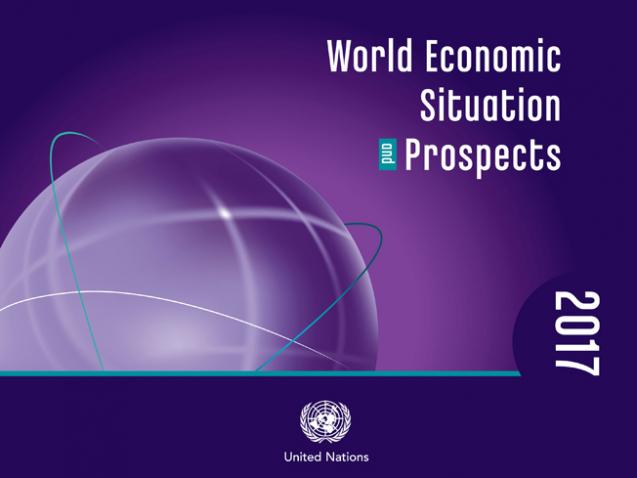Although a modest global recovery is projected for 2017-18, the world economy has not yet emerged from the period of slow growth, characterised by weak investment, dwindling trade and flagging productivity growth, according to the United Nations World Economic Situation and Prospects (WESP) 2017 report launched today.
The report states that the world economy expanded by just 2.2 per cent in 2016, the slowest rate of growth since the Great Recession of 2009. World gross product is projected to grow by 2.7 per cent in 2017 and 2.9 per cent in 2018, a slight downward revision from the forecasts made last May.
Launching the report at the UN Headquarters in New York, Mr. Lenni Montiel, Assistant Secretary-General for Economic Development, United Nations Department of Economic and Social Affairs, underscored the “need to redouble the efforts to bring the global economy back on a stronger and more inclusive growth path and create an international economic environment that is conducive to sustainable development.”
According to the report, the moderate improvement expected for 2017/18 is more an indication of economic stabilization than a signal of a robust and sustained revival of global demand. As commodity prices trend higher, commodity-exporting economies are likely to see some recovery in growth.
Developing countries continue to be the main drivers of global growth, accounting for about 60 per cent of the world’s gross product growth in 2016-18. East and South Asia remain the world’s most dynamic regions, benefiting from robust domestic demand and supportive macroeconomic policies.
The report projects that growth in the developed economies will slightly improve in 2017, but headwinds arising from weak investment and policy uncertainty continue to constrain economic activity.
GDP growth in the least developed countries (LDCs) is projected to remain well below the Sustainable Development Goals (SDGs) target of at least 7 per cent. This represents a key issue to address if the SDGs overall are to be attained. The report notes, specifically, that under the current growth trajectory and assuming no decline in income inequality, nearly 35 per cent of the population in LDCs may remain in extreme poverty by 2030.
Weak investment and productivity growth
The report identifies prolonged weak investment as a major cause of the slowdown in global growth. Many economies have experienced a marked downturn in private and public investment in recent years, particularly in the oil and extractive industries. In commodity-exporting countries, Governments have curtailed much-needed public investment in infrastructure and social services, in response to sharp revenue losses. At the same time, labour productivity growth has slowed markedly in most developed economies and in many large developing and transition economies.
The report stresses the importance of investment in new capital as a driver of technological change and efficiency gains. In particular, it concludes that investment in key areas, such as research and development, education and infrastructure, can serve to promote social and environmental progress, while also supporting productivity growth.
Environmental sustainability
The report highlights some positive developments related to environmental sustainability. The level of global carbon emissions has stalled for two consecutive years. This reflects the declining energy intensity of economic activities and the rising share of renewables in the overall energy structure, but also slower economic growth in some major emitters.
The report found that renewable energy investment in the developing countries exceeded that of the developed countries in 2015. However, the report also warns that without concerted policy efforts from both the public and private sector, the recent improvements in emissions mitigation could easily reverse.
Risks and policy challenges
The report cautions that the global outlook faces significant uncertainties and risks. A high degree of uncertainty is identified in the international policy environment and elevated foreign currency-denominated debt levels as key downside risks that may derail the already modest global growth prospects.
Given the close linkages between demand, investment, trade and productivity, the extended episode of weak global growth may prove self-perpetuating in the absence of concerted policy efforts to revive investment and foster a recovery in productivity. The report notes that many countries continue to depend excessively on monetary policy to support growth.
In the context of a challenging economic and financial environment, a more balanced policy approach is required to not only restore a healthy medium-term growth trajectory, but also to achieve greater progress on sustainable development.
The global economy needs policy measures that move beyond demand management. These measures need to be fully integrated with structural reforms that target the various aspects of sustainable development, including poverty, inequality and climate change.
The report also calls for greater international policy cooperation and coordination, particularly in the areas of trade and investment. Deeper international cooperation is also needed to expedite clean technology transfer, raise climate finance, strengthen international tax cooperation and address the challenges posed by large movements of refugees and migrants.
About the report: The World Economic Situation and Prospects report is the UN’s flagship publication on expected trends in the global economy. WESP is produced annually by the UN Department of Economic and Social Affairs (DESA), the UN Conference on Trade and Development (UNCTAD), the five UN regional commissions and the World Tourism Organisation (UNWTO).
About UN DESA
UN DESA Products
UN DESA Divisions
- Office of Intergovernmental Support and Coordination for Sustainable Development
- Division for Sustainable Development Goals
- Population Division
- Division for Public Institutions and Digital Government
- Financing for Sustainable Development Office
- Division for Inclusive Social Development
- Statistics Division
- Economic Analysis and Policy Division
- United Nations Forum on Forests
- Capacity Development Programme Management Office

